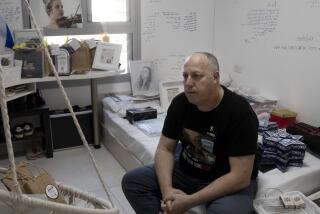Game Has Promised Land on the Line
Can you name the ancient Greek practice that is the model for the Passover Seder?
That’s one of the tougher questions Syndi Kercher came up with for her new “Exodus, the Game of Passover.” She stumped a rabbi with it. In fact, the Seder, which marks the beginning of the holiday week Wednesday evening, is modeled after a Greek symposium, where philosophers compared notes over dinner, she says.
Three years ago, Kercher, then 34, was a schoolteacher in Tucson, with much experience creating educational play for kids. After a ho-hum Passover with her family, she decided to apply her skills at home.
“My kids were getting lackadaisical,” says Kercher, whose son and daughter were preteens at the time. “They just sat around waiting for the matzo ball soup.”
Obstacles inspire her. “I told my grandma I wanted to be in charge of Passover the next year,” she says. Grandma agreed, and at the next Seder, Kercher brought along a prototype for her game.
The whole family played. “It was a blast,” Kercher recalls. Based loosely on Monopoly and a trivia game, the Exodus board shows the route the Israelites followed as they escaped slavery in Egypt and traveled through the Sinai desert to Canaan, the Promised Land.
Players draw questions and then move ahead if they give the right answer. They also get chances to spin the “wheel of plagues” and to send their opponents back to Egypt or prevent them from taking a turn. Seder plate chips can be used to block the plagues, allowing players to be “passed over” without being harmed. The first to reach the Promised Land wins.
Since Kercher’s family first played the game, she has gone through an exodus of her own, leaving teaching to devote her time to exploring the board-game business, with several other new games now in the works. She started by scouting the competition at toy fairs and Judaica shops. A graphic artist friend helped her package her product and put it on the market, priced at $24.95. Judaica stores around the country, including the Mitzvah Store in Los Angeles, stock the game.
Marge Eiseman, a Hebrew school teacher in Milwaukee, discovered Kercher’s game at an educational conference. She bought one for her fourth-graders and one for her three children to play at home. Her students cheer when she takes out the game and divides the class into teams. “We play it a few weeks before Passover so I can find out what the students need to learn,” she says. After a few history lessons, they play again, and Eiseman measures the students’ improvement by the number of questions they get wrong. At a match last week, there were only three or four incorrect answers.
Some of the game’s questions lead to what Eiseman calls “teachable moments.” How long does Passover last? It depends on whom you ask. Reform Jews say there are seven days, Conservative and Orthodox Jews say eight. “The extra day is added to mourn the destruction of the Second Temple in Jerusalem in 70 AD,” Eiseman says. “Reform Jews don’t do that.”
Researching Jewish history for the game changed Kercher’s feelings about her religion. Raised Jewish, she always celebrated the major holidays but never considered herself to be devout. Lately, though, she is a regular at Friday night services, after which she, her husband and teenage children sit down to a Sabbath dinner.
More to Read
The biggest entertainment stories
Get our big stories about Hollywood, film, television, music, arts, culture and more right in your inbox as soon as they publish.
You may occasionally receive promotional content from the Los Angeles Times.










